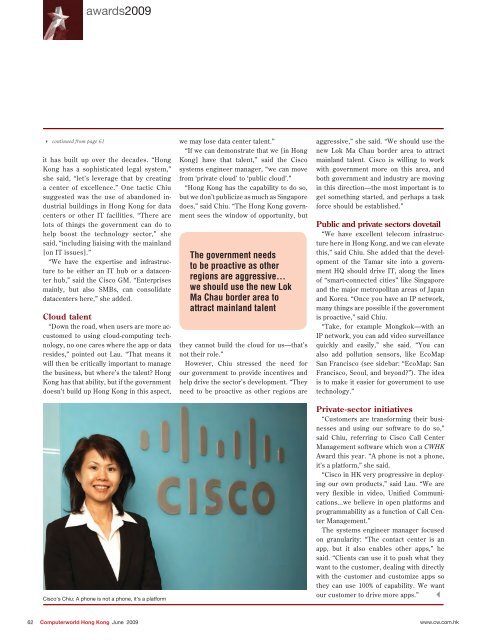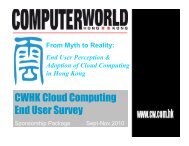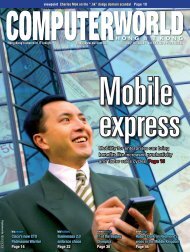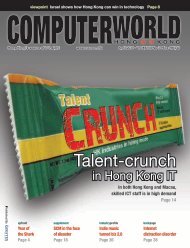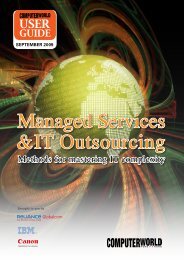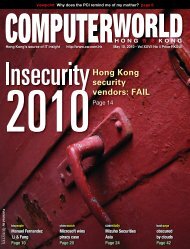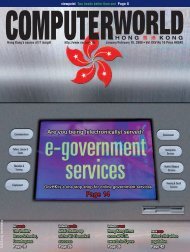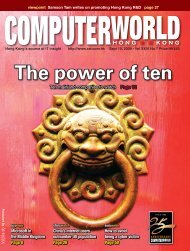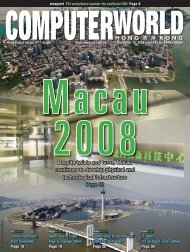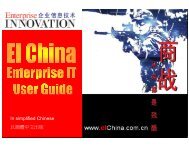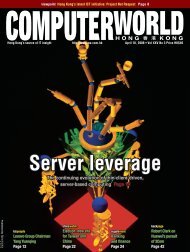Download - enterpriseinnovation.net
Download - enterpriseinnovation.net
Download - enterpriseinnovation.net
- No tags were found...
Create successful ePaper yourself
Turn your PDF publications into a flip-book with our unique Google optimized e-Paper software.
awards2009 continued from page 61it has built up over the decades. “HongKong has a sophisticated legal system,”she said, “let’s leverage that by creatinga center of excellence.” One tactic Chiusuggested was the use of abandoned industrialbuildings in Hong Kong for datacenters or other IT facilities. “There arelots of things the government can do tohelp boost the technology sector,” shesaid, “including liaising with the mainland[on IT issues].”“We have the expertise and infrastructureto be either an IT hub or a datacenterhub,” said the Cisco GM. “Enterprisesmainly, but also SMBs, can consolidatedatacenters here,” she added.Cloud talent“Down the road, when users are more accustomedto using cloud-computing technology,no one cares where the app or dataresides,” pointed out Lau. “That means itwill then be critically important to managethe business, but where’s the talent? HongKong has that ability, but if the governmentdoesn’t build up Hong Kong in this aspect,Cisco’s Chiu: A phone is not a phone, it’s a platformwe may lose data center talent.”“If we can demonstrate that we [in HongKong] have that talent,” said the Ciscosystems engineer manager, “we can movefrom ‘private cloud’ to ‘public cloud’.”“Hong Kong has the capability to do so,but we don’t publicize as much as Singaporedoes,” said Chiu. “The Hong Kong governmentsees the window of opportunity, butThe government needsto be proactive as otherregions are aggressive...we should use the new LokMa Chau border area toattract mainland talentthey cannot build the cloud for us—that’snot their role.”However, Chiu stressed the need forour government to provide incentives andhelp drive the sector’s development. “Theyneed to be proactive as other regions areaggressive,” she said. “We should use thenew Lok Ma Chau border area to attractmainland talent. Cisco is willing to workwith government more on this area, andboth government and industry are movingin this direction—the most important is toget something started, and perhaps a taskforce should be established.”Public and private sectors dovetail“We have excellent telecom infrastructurehere in Hong Kong, and we can elevatethis,” said Chiu. She added that the developmentof the Tamar site into a governmentHQ should drive IT, along the linesof “smart-connected cities” like Singaporeand the major metropolitan areas of Japanand Korea. “Once you have an IP <strong>net</strong>work,many things are possible if the governmentis proactive,” said Chiu.“Take, for example Mongkok—with anIP <strong>net</strong>work, you can add video surveillancequickly and easily,” she said. “You canalso add pollution sensors, like EcoMapSan Francisco (see sidebar: “EcoMap: SanFrancisco, Seoul, and beyond?”). The ideais to make it easier for government to usetechnology.”Private-sector initiatives“Customers are transforming their businessesand using our software to do so,”said Chiu, referring to Cisco Call CenterManagement software which won a CWHKAward this year. “A phone is not a phone,it’s a platform,” she said.“Cisco in HK very progressive in deployingour own products,” said Lau. “We arevery flexible in video, Unified Communications...webelieve in open platforms andprogrammability as a function of Call CenterManagement.”The systems engineer manager focusedon granularity: “The contact center is anapp, but it also enables other apps,” hesaid. “Clients can use it to push what theywant to the customer, dealing with directlywith the customer and customize apps sothey can use 100% of capability. We wantour customer to drive more apps.” 62 Computerworld Hong Kong June 2009 www.cw.com.hk


